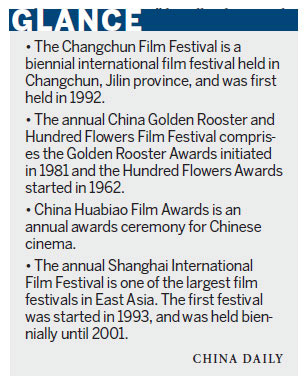Reel Beijing
Updated: 2012-04-25 09:33
By Liu Wei (China Daily)
|
|||||||||||
 |
|
American director James Cameron and Wendi Deng Murdoch attend an event at the Beijing International Film Festival. Photos by Jiang Dong / China Daily |
 |
|
Actress Fan Bingbing, director Feng Xiaogang and singer Wang Lee-hom walk the festival's opening night red carpet. |

The second installment of the capital's film festival shows vitality - and, sometimes, immaturity. Liu Wei reports in Beijing.
It is quite logical that Beijing would host a grand film festival - the capital produces half the country's films, hosts the most studios and the best film school, and has contributed more to the box office than any other city.
You could even say it was overdue when it arrived last year.
The second installment of the Beijing International Film Festival (BJIFF) started on Monday. It ambitiously aspires to showcase how important the film culture and industry are in a rapidly growing market.
The event is supported by the local government and the State Administration of Radio, Film and TV (SARFT).
"The Beijing festival will help define the capital as a national cultural center and contributor to the exchange and prosperity of the global film industry," Beijing's mayor Guo Jinlong, who's the festival's honorary chairman, says at the opening ceremony.
While China imports only about 20 foreign films for theatrical releases a year, filmgoers will see some of the most acclaimed commercial blockbusters and art house pieces during the festival.
A dazzling list of 260 films, including Martin Scorsese's Hugo and all three installments of The Lord of the Rings, are available in 20 theaters from April 23-28.
What opens and closes the gala for cinephiles are A Separation and The Artist, respectively, the best foreign language film and best picture among this year's Academy Awards.
Some of the most acclaimed art house pictures in recent years, such as The Tree of Life and The Kid with a Bike, are also included.
Coming along are A-listers and major Hollywood studios that hope to better approach the world's most rapidly growing film market.
China's box office has been growing by an average of 30 percent every year since 2003 to reach 1.3 billion yuan ($200 million) in 2011. It has generated the highest foreign gross for many Hollywood blockbusters, such as Avatar, Kung Fu Panda 2 and Transformers 3.
James Cameron, whose Titanic 3D has grossed about 500 million yuan ($79 million) in China since its April 10 premiere, gave a lecture on 3D technology and shared behind-the-scenes stories with local filmmakers.
"I am impressed by Chinese audiences' true embrace and high acceptance of 3D and in-theater experiences," he tells China Daily.
Hollywood studios have a strong presence. Disney brings Jeremy Renner, who plays Hawkeye as part of the ensemble of superheroes in The Avengers, to be released in China on May 5.
"Our decision to bring the film to the BJIFF fully reflects Disney's longstanding commitment to supporting the film industry of China," says Jo Yan, senior vice-president, Walt Disney Studios Distribution, Greater China.
"The fact that we're able to invite one of Hollywood's fastest rising stars and two-time Oscar nominee Jeremy Renner to come to the festival's opening night red carpet and help promote our movie is a very clear indication of China's importance as the No 2 biggest international market outside of North America."
Adding to the boom is the new deal between China and the United States hammered out earlier this year that increases the quota of foreign films in Chinese theaters from 20 to 34. And foreign studios' box office share will grow to 25 percent, up from the current 13 percent.
Confronting more Hollywood productions face-to-face poses challenges for Chinese filmmakers - as well as opportunities to learn and cooperate.
"It is a big step forward for both China's and US film communities," Fox Filmed Entertainment Chairman James Gianopulos says.
"By bringing more movies, hopefully, we will open the eyes of filmmakers here - what makes a movie work, why do Titanic and Avatar work. The more the Chinese film community is exposed to that - the more filmmakers like James Cameron come over here and interact with the local film community - the better."
"Cooperation" is the key word on the Beijing event's schedule.
Cameron confirms his company will provide 3D camera and production technology for The Art of War, a Chinese epic based on an ancient book about military strategies.
At a forum on Tuesday, the director and his producer John Landau talked with China Film Group Corporation's chairman Han Sanping about how to work together to better incorporate technology into filmmaking. Executives of major Hollywood and local studios, such as Disney, 20th Century Fox and Huayi Brothers, explored co-productions, among other topics.
Like some of the most prestigious international film festivals, such as those in Cannes and Pusan, Beijing has also attached great importance to the film trade.
During the first BJIFF, 334 film institutions with more than 800 professionals from China and overseas attended the film market section. They announced 256 contracts worth about $427 million.
This year, more than 500 institutions will take part, the section's director Wang Yu says.
He also reveals the festival will start a pitch-and-catch section to support new directors this year. They have received 137 projects from which a committee of filmmakers and insiders will select 20, and provide equipment and financial support.
There's no competition section, but the festival's vice-president Zhang Huijun says it will start next year. An award system, he says, will boost communication between filmmakers at home and abroad.
Although Beijing is ambitious enough to have secured a position on the crowded film festival calendar, it faces challenges as a newcomer.
The most obvious competitor is the Shanghai International Film Festival, an established institution that will kick off its 15th run in June.
"Shanghai started early and has been very professional," says Ben Ji, president of Angel Wings Entertainment, a Beijing-based film financing and production group.
Ji says the Shanghai event's staff will visit studios and filmmakers in Beijing six months before the festival opens to listen to their needs and seek cooperation opportunities.
But a financing forum he hosted, attended by producers and investors, at the first BJIFF in 2011 was abruptly halted by a ceremony announcing the number of contracts signed.
This year's schedule has the two most important seminars on the same day, with an hour of overlap.
While Beijing is proud of its screening list, in 2011 filmgoers could only buy tickets the day before the schedule at every theater. Some screenings were re-scheduled or cancelled at the last minute.
Viewers must still check every theater themselves a day before, and there's no online purchasing channel this year.
These problems have plagued many ambitious new festivals, which need time to improve, observes Scarlette Pan, a senior movie reporter and frequent visitor to Cannes, Berlin and Venice.
"Beijing's scale and stardom has been impressive," she says.
"However, to live up to the significance of its location as a city in China and the world's film industry, it needs to take care of not only the big names but also the most ordinary participants, such as filmgoers, journalists and traders."
Related Stories
Red carpet for closing of Shanghai film fest 2011-06-20 17:07
Turkish film wins top prize at Shanghai 2011-06-20 17:07
Screen darlings scorch Cannes red carpet 2011-05-13 19:23
Oscar films for first Beijing film gala 2011-03-18 10:30
Beijing to host major Int'l Film Festival 2011-03-16 09:55
Today's Top News
President Xi confident in recovery from quake
H7N9 update: 104 cases, 21 deaths
Telecom workers restore links
Coal mine blast kills 18 in Jilin
Intl scholarship puts China on the map
More bird flu patients discharged
Gold loses sheen, but still a safe bet
US 'turns blind eye to human rights'
Hot Topics
Lunar probe , China growth forecasts, Emission rules get tougher, China seen through 'colored lens', International board,
Editor's Picks

|

|

|

|

|

|





